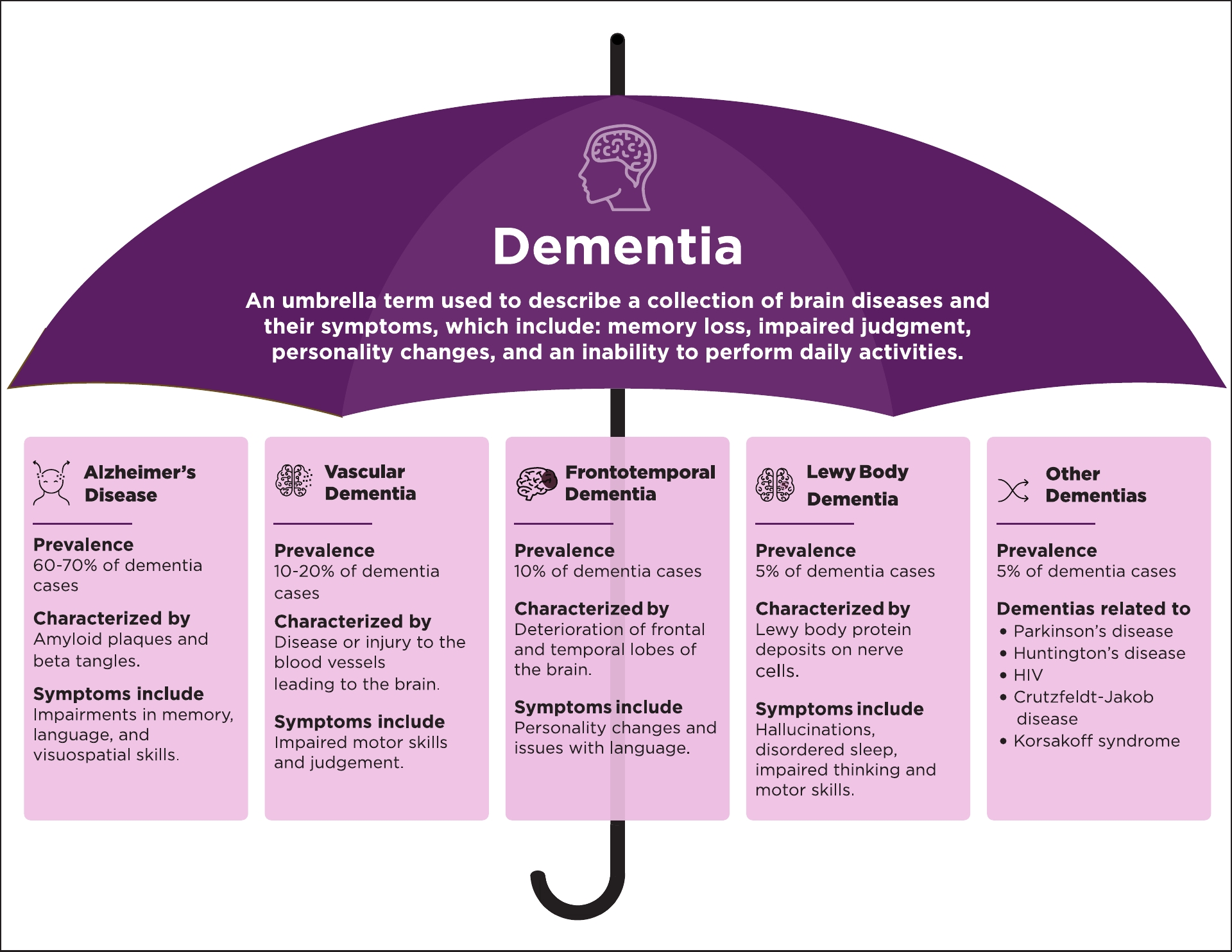Dementia is a collective term that is used to describe several brain diseases that affect memory and cognition. Many people do not realize they have dementia until the disease begins to progress and they start to have symptoms. Individuals need to be aware of the symptoms that may occur. A person also needs to know how they can get help with memory care for themselves or a loved one. Prompt care will help individuals learn to better manage their symptoms.
Diseases That Fall Under the Category of Dementia
As stated above, multiple brain diseases fall under the category of dementia. The following are some of these diseases with a brief description of each. Individuals who are diagnosed with one of these brain diseases need to learn how a community can help them cope with their symptoms, keep them safe, and allow them to live as independent a life as possible.
Alzheimer’s Disease
Alzheimer’s disease is one of the diseases that is most widely known. This disease affects around 60 to 70% of all dementia cases. Alzheimer’s disease is caused by amyloid plaques and beta tangles that develop within the brain of the sufferer. The following are some of the symptoms associated with Alzheimer’s disease.
- Memory impairment
- Visuospatial skill impairment
- Language impairments
Vascular Dementia
Vascular dementia occurs in around 10 to 20 percent of all dementia cases. This condition arises when disease or injury occurs to the vascular vessels of the brain. The following are some of the common symptoms of vascular dementia.
- Impaired judgment
- Motor skill impairment
Frontotemporal Dementia
Frontotemporal dementia only occurs in around 10% of all dementia cases. This disease causes deterioration in the temporal and frontal lobes of the brain. The following are some of the top symptoms frontotemporal dementia sufferers experience.
- Changes in personality
- Problems with language
Lewy Body Dementia
Lewy Body dementia is one of the rarest types of dementia, affecting only around 5% of cases. This brain condition is characterized by Lewy body protein deposits on the nerve cells in the body. The following are some of the top symptoms of this brain condition.
Other Forms of Dementia
Other types of dementia are as rare as Lewy Body dementia, affecting only around 5% of dementia patients. Some of these brain conditions are listed below.
- Parkinson’s disease
- HIV
- Huntington’s disease
- Crutzfeldt-Jakob disease
- Korsakoff syndrome
Signs to Look for When Dementia Strikes
Most people begin to experience severe cognitive declines as early as their thirties or forties. Unfortunately, many people do not realize dementia can strike at such an early age so they contribute their symptoms to other issues, including stress. The following are some of the common signs people should look for to determine if they or a loved one are suffering from possible dementia.
Memory Loss
Most often, the individual does not realize they are suffering from memory loss issues right away. In most cases, other people notice the problem first.
Communication Difficulties
Individuals may find it difficult to carry on conversations. They may also find it arduous to choose the right words during a conversation.
Visual and Spatial Difficulties
These most often present as getting lost frequently while driving. If a person suddenly finds it difficult to drive to locations they are familiar with, this could be a warning sign of dementia.
Problem Solving and Reasoning
Although everyone can suffer from problem solving and reasoning issues at some point in their lives, these issues should not be commonplace. If they are occurring daily, individuals need to seek help from their doctor.
Coordination and Motor Function
Fine motor skills tend to suffer when someone develops dementia. Individuals may also begin to stumble and fall often. Although these issues occur during the aging process, if they become pronounced, dementia could be the cause.
Confusion and Disorientation
Confusion and disorientation are both common in people with dementia. If a person begins getting confused and disorientated daily, they need to be evaluated to see if dementia is causing these concerns.
Get Professional Intervention
Once a person has been diagnosed with dementia, they need to seek proper treatment to ensure their brain disease is managed properly. Because dementia patients often need integral care, it is important to explore the treatment and care options available. Now is the time to seek this care so dementia residents will live safe and happy lives. Integral care ensures families get the help they need.
Summerfield of Roseville is a memory care community that specializes in providing care for dementia residents. They keep residents engaged and help them live life to the fullest, with safety practices in place throughout the community.

